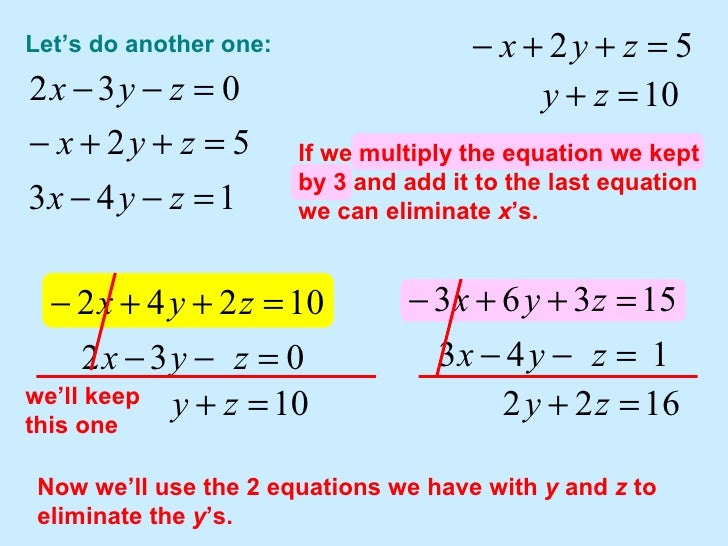
Cross Multiplication MethodĬonsider a system of linear equations: a 1x + b 1y + c 1 = 0 and a 2x + b 2y + c 2 = 0. Therefore, the solution of the given system is x=1 and y=3. Substitute x=1 this in the equation y=(7-x)/2: Substitute this in the equation, 2x-5y+13=0: Solution: Let us solve the equation, x+2y-7=0 for y:
:max_bytes(150000):strip_icc()/8aa-56a602163df78cf7728adc3d.jpg)
In that case, each point on that line is a solution of the given system and hence the given system has an infinite number of solutions.Ĭonsistent and Inconsistent System of Linear Equations: In some other cases, both lines coincide with each other. In that case, the system of linear equations in two variables has no solution. Thus, the solution of the given system of linear equations is x=1 and y=2.īut both lines may not intersect always. As you can see below, both lines meet at (1, 2). Solution: We will graph them and see whether they intersect at a point. Step 5: The point of intersection is the solution of the given system.Įxample: Find the solution of the following system of equations graphically.Step 4: Identify the point where both lines meet.

Step 3: Start putting the values of x as 0, 1, 2, and so on and find the corresponding values of y, or vice-versa.Step 2: To graph an equation manually, first convert it to the form y=mx+b by solving the equation for y.


Graphical Method for Solving Linear Equations in Two Variables There are five methods to solve a system of linear equations in two variables. Methods of Solving Linear Equations in Two VariablesįAQs on Linear Equations in Two Variables What are Linear Equations in Two Variables?įorms of Linear Equations in Two Variables For example, y = 2x + 3 and 2y = 4x + 9 are two-variable linear equations. They are the equations of the first order. Linear equations in two variables are the algebraic equations which are of the form (or can be converted to the form) y = mx + b, where m is the slope and b is the y-intercept. The set of solutions obtained by solving these linear equations is a straight line. An important thing to keep in mind while solving linear equations with n number of variables is that there must be n equations to solve and determine the value of variables. A linear system of equations may have 'n' number of variables. A system of equations with two variables has a unique solution, no solutions, or infinitely many solutions. A linear equation in two variables is an equation in which two variables have the exponent 1.


 0 kommentar(er)
0 kommentar(er)
